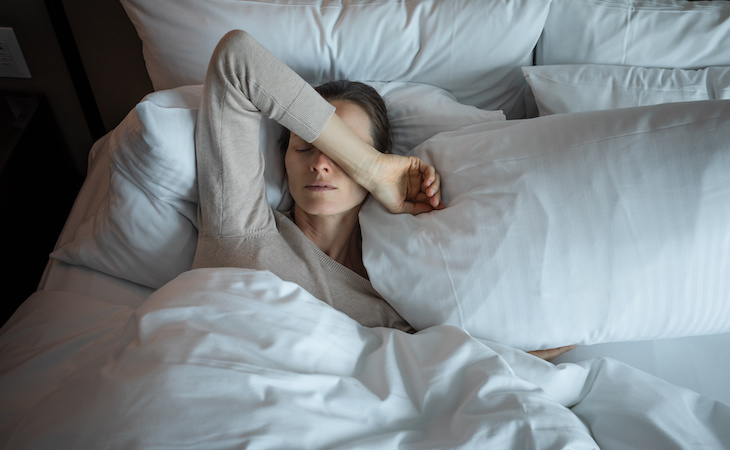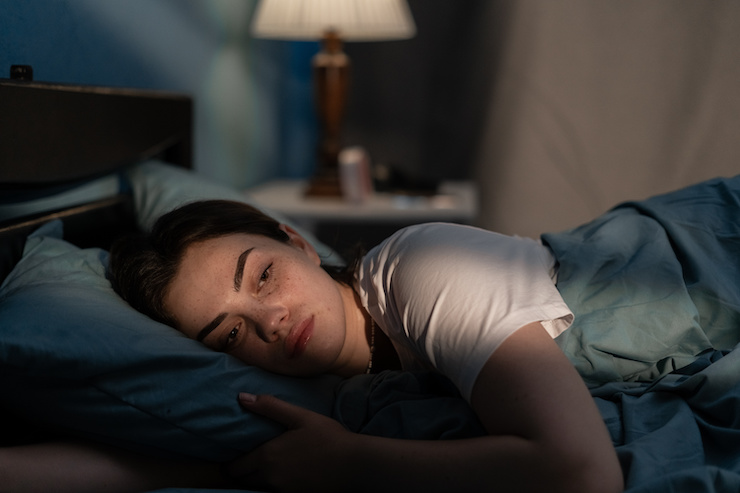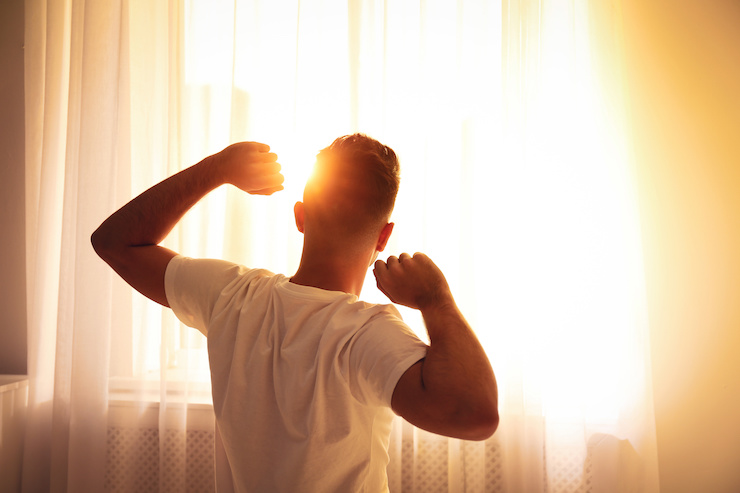
Sleep Disorders & Conditions, Sleep Health
June 12, 2025
How to Deal With Morning Depression
Written by Leandra Beabout

Morning depression, or diurnal variation, is a pattern where depressive symptoms—like hopelessness, fatigue, or sadness—feel worse in the morning. It’s often linked to hormonal shifts, poor sleep, and stress about the day ahead. Treatments include gentle routines, reframing thoughts, and seeking medical support if symptoms persist or worsen over time.
If you’re reading this, you might be searching for an explanation for why you feel so depressed in the mornings. Or maybe you have already been diagnosed with depression and wonder why your mood is at its worst when you first wake up.
The truth is depression can feel worse at certain times of day, and for many people, mornings are hardest. In this article, we dive into what causes morning depression and how to deal with it.
What is morning depression?
The technical term for morning depression is diurnal variation. It’s a mood pattern typically associated with melancholic depression, a sub-type of major depressive disorder, according to Barbara Sparacino, MD, a triple board-certified physician, psychiatrist, and expert in aging parent care.
“While ‘morning depression’ isn’t a formal diagnosis, it’s a pattern many people live with—and it’s one that shows up in both the research and in real-life stories I hear from clients every week,” she says.
Morning depression, or diurnal variation, is a mood pattern typically associated with melancholic depression, a sub-type of major depressive disorder.
Symptoms of morning depression
Morning depression symptoms are the same as depression symptoms—they’re just noticeably worse in the morning.
According to the National Institute of Mental Health, depression symptoms include:
- Persistent sadness or hopelessness
- Feeling emotionally flat or “empty”
- Loss of interest in hobbies and activities
- Feeling worthless or helpless
- Trouble concentrating or completing tasks
Causes of morning depression
Sparacino says the main reasons people experience worse depression in the morning include:
- Hormonal fluctuations
- Poor sleep
- Anticipatory stress

The science behind morning depression
First, there’s cortisol, known as the stress hormone. Cortisol naturally spikes when you wake up because its job is to activate your mind and body into motion.
Sparacino says that for some people with depression, the morning spike “feels less like a boost and more like a wave of anxiety or despair.”
Depression also messes with your sleep cycle. Some people with depression sleep too much. Others develop insomnia. And when your sleep cycle is off, you feel off when you wake up too.
Sparacino says that’s because your brain needs good-quality sleep to reset mood-regulating chemicals like serotonin. Without good sleep, you wake up with a low or flat mood.
Finally, mornings are rough for some people with depression because waking up triggers thoughts about the day ahead.
Sparacino says some may feel like they’re hit with a tidal wave of responsibilities and overwhelm as soon as they open their eyes.
These negative thoughts only worsen the stress caused by cortisol or moodiness caused by poor sleep.
Diagnosing morning depression
Getting a diagnosis for any type of depression starts with telling your healthcare provider about your symptoms.
From there, your doctor will review your medical history and discuss existing health conditions, sleep patterns, and external stressors. You might be asked to start tracking your moods or take a depression screening test.
“In some cases, we might run labs to check for thyroid issues, anemia, vitamin deficiencies, or other medical conditions that mimic mood disorders,” says Sparacino.

Treatment options for morning depression
It’s a good idea to tell your doctor if you’re experiencing depression symptoms every morning. But you can also try to:
- Create a gentle morning routine. Take a few minutes to sip water or your favorite hot drink while exposing yourself to sunlight next to a window. Then, try a few light stretches before getting ready for your day.
- Reframe negative thoughts. If you wake up and immediately begin stressing about the day ahead, try to pause, acknowledge the thought, and then reframe it into something compassionate, such as: “This is hard, but I’ve done this before, so I know I can do it again.”
- Adjust expectations of yourself. “Build in grace,” suggests Sparacino. “That might mean not scheduling anything emotionally demanding before 10 am—or starting your day with something simple but grounding, like journaling or a short walk.”
If these changes don’t improve your morning depression, it’s time to tell your healthcare provider or therapist about your symptoms. Getting help is the first step toward feeling better, and as Sparacino tells her clients: “There’s no prize for pushing through alone.”
FAQs
Why do you feel the worst in the morning?
Some people with depression experience worse symptoms in the morning. This is known as diurnal variation and can be caused by several factors, including hormone fluctuations and poor sleep hygiene.
Why don’t I want to get up in the morning?
There are several possible reasons for not wanting to get up in the morning. You might not have gotten enough sleep or be experiencing sleep inertia. If you notice that you don’t want to get up in the morning every day for more than a couple of weeks, you might also have depression.
Why am I in a bad mood when I wake up in the morning?
You may feel moody or low in the mornings because of a spike in cortisol, poor sleep the night before, or anticipatory stress or anxiety about the day ahead.
How can I fix my mood in the morning?
Sparacino suggests creating a morning routine involving light movement, sunlight exposure, and “micro-joys” such as music you love or cozy socks you wear while getting ready for your day. It’s also important to seek support if you experience chronic morning moodiness because it could be an underlying condition such as depression.
How does sleep affect your mood? Learn all about the connection between mental health and sleep.
Leandra Beabout
Leandra Beabout is a freelance health and travel writer based between Indiana and India. Her work has been published in Reader’s Digest, Greatist, The Guardian, CNN Travel, Lonely Planet, and more. She was previously an English teacher and daily newspaper reporter.


